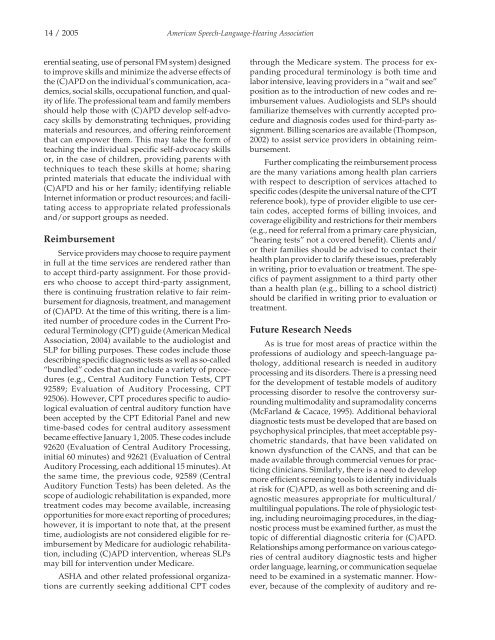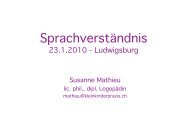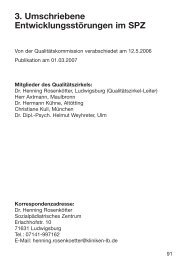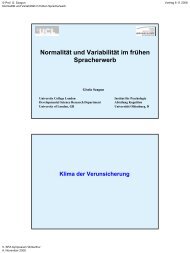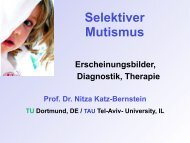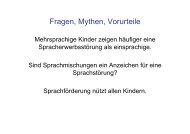(Central) Auditory Processing Disorders - Technical Report
(Central) Auditory Processing Disorders - Technical Report
(Central) Auditory Processing Disorders - Technical Report
- No tags were found...
You also want an ePaper? Increase the reach of your titles
YUMPU automatically turns print PDFs into web optimized ePapers that Google loves.
14 / 2005<br />
American Speech-Language-Hearing Association<br />
erential seating, use of personal FM system) designed<br />
to improve skills and minimize the adverse effects of<br />
the (C)APD on the individual’s communication, academics,<br />
social skills, occupational function, and quality<br />
of life. The professional team and family members<br />
should help those with (C)APD develop self-advocacy<br />
skills by demonstrating techniques, providing<br />
materials and resources, and offering reinforcement<br />
that can empower them. This may take the form of<br />
teaching the individual specific self-advocacy skills<br />
or, in the case of children, providing parents with<br />
techniques to teach these skills at home; sharing<br />
printed materials that educate the individual with<br />
(C)APD and his or her family; identifying reliable<br />
Internet information or product resources; and facilitating<br />
access to appropriate related professionals<br />
and/or support groups as needed.<br />
Reimbursement<br />
Service providers may choose to require payment<br />
in full at the time services are rendered rather than<br />
to accept third-party assignment. For those providers<br />
who choose to accept third-party assignment,<br />
there is continuing frustration relative to fair reimbursement<br />
for diagnosis, treatment, and management<br />
of (C)APD. At the time of this writing, there is a limited<br />
number of procedure codes in the Current Procedural<br />
Terminology (CPT) guide (American Medical<br />
Association, 2004) available to the audiologist and<br />
SLP for billing purposes. These codes include those<br />
describing specific diagnostic tests as well as so-called<br />
“bundled” codes that can include a variety of procedures<br />
(e.g., <strong>Central</strong> <strong>Auditory</strong> Function Tests, CPT<br />
92589; Evaluation of <strong>Auditory</strong> <strong>Processing</strong>, CPT<br />
92506). However, CPT procedures specific to audiological<br />
evaluation of central auditory function have<br />
been accepted by the CPT Editorial Panel and new<br />
time-based codes for central auditory assessment<br />
became effective January 1, 2005. These codes include<br />
92620 (Evaluation of <strong>Central</strong> <strong>Auditory</strong> <strong>Processing</strong>,<br />
initial 60 minutes) and 92621 (Evaluation of <strong>Central</strong><br />
<strong>Auditory</strong> <strong>Processing</strong>, each additional 15 minutes). At<br />
the same time, the previous code, 92589 (<strong>Central</strong><br />
<strong>Auditory</strong> Function Tests) has been deleted. As the<br />
scope of audiologic rehabilitation is expanded, more<br />
treatment codes may become available, increasing<br />
opportunities for more exact reporting of procedures;<br />
however, it is important to note that, at the present<br />
time, audiologists are not considered eligible for reimbursement<br />
by Medicare for audiologic rehabilitation,<br />
including (C)APD intervention, whereas SLPs<br />
may bill for intervention under Medicare.<br />
ASHA and other related professional organizations<br />
are currently seeking additional CPT codes<br />
through the Medicare system. The process for expanding<br />
procedural terminology is both time and<br />
labor intensive, leaving providers in a “wait and see”<br />
position as to the introduction of new codes and reimbursement<br />
values. Audiologists and SLPs should<br />
familiarize themselves with currently accepted procedure<br />
and diagnosis codes used for third-party assignment.<br />
Billing scenarios are available (Thompson,<br />
2002) to assist service providers in obtaining reimbursement.<br />
Further complicating the reimbursement process<br />
are the many variations among health plan carriers<br />
with respect to description of services attached to<br />
specific codes (despite the universal nature of the CPT<br />
reference book), type of provider eligible to use certain<br />
codes, accepted forms of billing invoices, and<br />
coverage eligibility and restrictions for their members<br />
(e.g., need for referral from a primary care physician,<br />
“hearing tests” not a covered benefit). Clients and/<br />
or their families should be advised to contact their<br />
health plan provider to clarify these issues, preferably<br />
in writing, prior to evaluation or treatment. The specifics<br />
of payment assignment to a third party other<br />
than a health plan (e.g., billing to a school district)<br />
should be clarified in writing prior to evaluation or<br />
treatment.<br />
Future Research Needs<br />
As is true for most areas of practice within the<br />
professions of audiology and speech-language pathology,<br />
additional research is needed in auditory<br />
processing and its disorders. There is a pressing need<br />
for the development of testable models of auditory<br />
processing disorder to resolve the controversy surrounding<br />
multimodality and supramodality concerns<br />
(McFarland & Cacace, 1995). Additional behavioral<br />
diagnostic tests must be developed that are based on<br />
psychophysical principles, that meet acceptable psychometric<br />
standards, that have been validated on<br />
known dysfunction of the CANS, and that can be<br />
made available through commercial venues for practicing<br />
clinicians. Similarly, there is a need to develop<br />
more efficient screening tools to identify individuals<br />
at risk for (C)APD, as well as both screening and diagnostic<br />
measures appropriate for multicultural/<br />
multilingual populations. The role of physiologic testing,<br />
including neuroimaging procedures, in the diagnostic<br />
process must be examined further, as must the<br />
topic of differential diagnostic criteria for (C)APD.<br />
Relationships among performance on various categories<br />
of central auditory diagnostic tests and higher<br />
order language, learning, or communication sequelae<br />
need to be examined in a systematic manner. However,<br />
because of the complexity of auditory and re-


